Archive for August, 2009
Timeless wisdom: traditional healing in Africa
Posted on August 31, 2009, by mercedes, under Gender Masala.
Tall, thin and dreadlocked, Kwame Sousa is an artist, a documentary film producer, and an avid soccer player. Whenever he sprains a muscle, he visits his granny or the neighbourhood traditional healer for a rub with a homemade herbal potion.
“It smells strongly of wine gone vinegary but it works ,” he says.
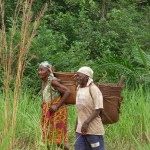
The forest is their pharmacy. Photo: M. Sayagues
Last year, when he was scratching madly with chickenpox, his granny’s ointment of coconut oil and leaves relieved the itchiness.
When his friend Geane Castro feels a cold coming, his grandmother makes him a hot bath with water infused with leaves and bark, then a special tea with plants she gathers in the forest. Presto, he recovers.
I meet them at Teia D’Arte, an art gallery in Sao Tome, the capital of the tiny two-island nation of Sao Tome and Principe, off the coast of Gabon.
With a rich biodiversity of 600 botanical species and 132 endemic plants, the islands’ rainforest is a well-stocked pharmacy for herbalists.
Their knowledge is captured in a decade-long ethno-pharmacological study published last year. Researchers worked with 40 traditional healers, midwives and grandmothers to identify and classify 325 medicinal plants, note 1,000 recipes and test 25 plants in the lab. Many look promising for developing new medicines. (more…)
53 Comments
Runner Caster Semenya: gender, sex and discrimination
Posted on August 26, 2009, by mercedes, under Gender Masala, adolescents, culture, health, human rights, media, stereotypes, women, men and more.
Open letter by South African gender activists
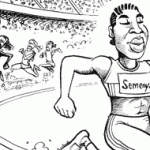
Courtesy of Zapiro, Mail & Guardian
Some of those championing Caster Semenya’s cause accuse those wanting to sex-test Caster of imperialism and racism (as well as sexism). Others plead to wait before reaching a verdict, arguing that the realities of sex testing are enormously complex
Firstly to address the issue of terminology, over which there seems to be confusion. Gender is the dominant society’s views on how women and men should look, behave, what roles they should play in society, how they should perform and frequently what rewards they receive – hence gender inequity. This has usually led to lower status and discrimination against girls/women but has increasingly been seen as limiting the options and potentially harming boys/men too.
Gender is not a politically correct term for sex. Sex testing would be just that - establishing whether a person is biologically female or male. So gender testing is not the term that should be used this case, but sex testing. (more…)
108 Comments
Whose pleasure? Notes about male circumcision and female sexuality
Posted on August 24, 2009, by mercedes, under Gender Masala, HIV/AIDS, culture, health, media, women, men and more.
Guest blogger: Pierre Brouard, Deputy Director, Centre for the Study of Aids, University of Pretoria, South Africa
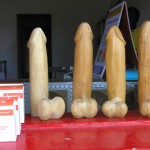
Hard task: defining sexual pleasure. Photo: M. Sayagues
So what headlines have grabbed you lately about male circumcision in South Africa? These caught my eye:
“The death toll in the Eastern Cape’s winter circumcision season has risen to 31”
“Circumcision ’scam’ probed”
“Two on run after initiate dies”
As alarming and distressing as these headlines are – and the sad, desperate and greedy subtexts embedded in them – they don’t say much about the other big debate that is raging across southern Africa: the value of male circumcision to prevent HIV acquisition in heterosexual men, and what’s in it for women. (more…)
95 Comments
Rubbing it the wrong way: condom-grabbing tourists
Posted on August 20, 2009, by mercedes, under Gender Masala, HIV/AIDS, health, media, stereotypes, women, men and more.
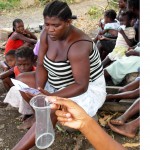
A Femidom demo. Photo: M. Sayagues/Irin
In a contest for irresponsible tourism, taking the last two female condoms at a Botswana border post as a souvenir would run neck-and-neck with littering the Central Kalahari Game Reserve with soda cans. Hey, spare a thought for a sister: a local woman might need them. I mean the condoms, not the soda cans.
Journalist Bridget Hilton-Barber writes, in the South African weekly Mail & Guardian, about the female condom’s popularity among Batswana women. (Femidoms rub the right way, 14 August). Then she plucked the last ones at the border post, as a souvenir, to lie in her office drawer.
Well, their popularity is a very good reason to leave the condoms in the box for someone who wants to use them.
Correction: Someone who needs to use them.
An average of three out of ten pregnant women at public antenatal clinics in Botswana are HIV-positive. This is an improvement over ten years ago, when four or five out of ten pregnant women were HIV-positive. Condoms helped achieve this drop. (Read about AIDS in Botswana here) (more…)
105 Comments
Getting the UN into GEAR!
Posted on August 17, 2009, by mercedes, under Gender Masala, human rights, media, politics, women, men and more.
By Sharon Bhagwan Rolls, founding coordinator, femLINKPACIFIC
Contributing blogger
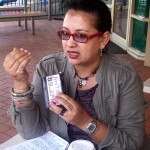
Sharon Bhagwan Rolls
Getting into GEAR! What does this really mean in a Pacific Island state, surrounded by an ocean rising rather too quickly, that some of us are thinking about getting into gear before it becomes a sink or swim situation?
Does it mean we switch from paddling our own canoes at the pace known as “Pacific time” to powering our way into the future with the assistance of fuel guzzling outboard engines?
And as we rapidly negotiate our way through the waters, will we be protected by life jackets should there be any mishaps along the way?
5,325 Comments
Gabon’s people-friendly hospital
Posted on August 11, 2009, by mercedes, under Gender Masala, culture, health, women, men and more.
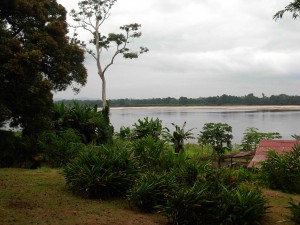
The Ogooué River seen from Dr. Schweitzer's home. Photo: M. Sayagues
I decided to visit my Nicaraguan friend who stays in a village called Fougamou, in central Gabon. So I looked up the nearest town, Lambaréné. It turned out to have a museum honouring Dr. Albert Schweitzer, who arrived there in 1913, built a hospital, and won a Nobel Peace Prize in 1952.
I had never been interested in him but it seemed like a truly off-the-beaten path museum, just my kind. But what sold me on Lambaréné was the name of its river: Ogooué. I HAD to see a river with such a wondrous name.
So I set off to Lambaréné on my way to Fougamou. Believe me, I was in the green heart of Africa. Green, as in rainforest.
I am glad I went. The river is awesome. The museum is charming. It preserves the old hospital and personal quarters from the 1920s as they were originally. (more…)
123 Comments
Star Trek hopelessly outdated
Posted on August 7, 2009, by mercedes, under Gender Masala, media, women, men and more.
Guest posting by Miren Gutierrez, IPS editor-in-chief

So 1960s...Star Trek masters and commanders are all men.
The other day I saw Star Trek. What an uncreative film. Listen, women: in the year 2387, men will still wear the pants and command the ship, while leggy women are busy being ornamental in mini skirts.
I don’t expect films to campaign for human rights, especially films of this nature. Space odysseys just have to be entertaining, surprising, ingenious. But Star Trek was just unimaginative, reproducing the social prejudices of the sixties, when the TV series on which this film is based started. As if nothing had changed…
145 Comments
Re-inventing the Warrior
Posted on August 3, 2009, by mercedes, under Gender Masala, media.
Old and new values in contemporary masculinities
Guest post by Trevor Davies, Director, African Fathers Initiative

Strong and caring men. Photo: Trevor Davies
This week I’ve been trying to get to grips with what at first glance seemed a real backward step in the struggle for gender equity.
For a long time, in my work around masculinities based on feminist analysis, I’ve opposed the idea that there was some golden age of manhood when men were strong and women were weak and needed to be looked after.
The premise of much of the mytho-poetic approach in masculinities is that we need to return to male power positive and caring values to cure the ills of our society such as gender-based violence, child abuse and crime.
I have found an intriguing manifestation of this idea in South Africa this week in The Mankind Project and its New Warrior programme. Their intention is twofold:
- To enable men to live lives of integrity, accountability, and connection to feeling.
- To be of service to the community at large, both as individual men with a renewed sense of passion and personal responsibility, and as communities of men working together to build sustainable relationships.
Sounds good!
9,661 Comments

